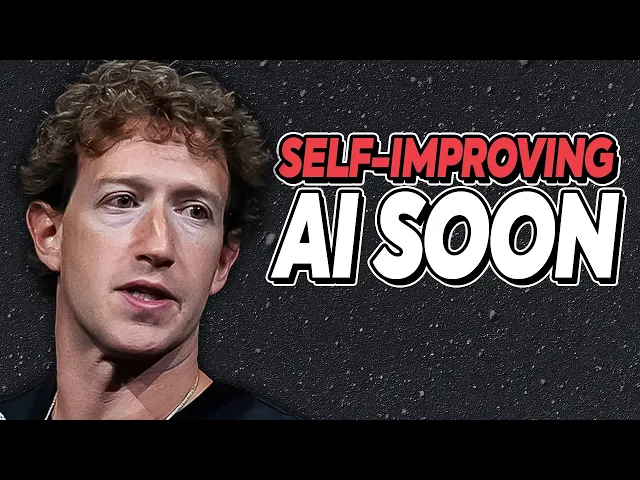Zuck and Satya: “Agents will write all code”

AI is eating your code for lunch
In an eye-opening fireside chat at Llamicon 2025, Meta's Mark Zuckerberg and Microsoft's Satya Nadella shared a startling prediction: within the next year, AI could be writing half of all code, with that proportion only growing from there. The discussion revealed how these tech giants are already heavily leveraging AI for software development and provided a glimpse into a radically different future of programming.
Key Points
-
Microsoft reports that 20-30% of code in some of their repositories is already written by AI, with acceptance rates for AI-generated code steadily increasing across programming languages (though Python sees the highest success rates).
-
Meta is focusing on building AI systems that can advance their own LLM development, potentially creating an "intelligence explosion" where AI can self-improve at an accelerating rate.
-
Both CEOs envision a complete rethinking of software infrastructure, with developers evolving into "tech leads" orchestrating teams of AI agents rather than writing most code themselves.
-
Neither company is dogmatic about closed vs. open-source models – Microsoft is deliberately diversifying beyond their OpenAI partnership to reduce platform risk.
The Code Revolution Happening Under Our Noses
The most striking takeaway from this conversation isn't just the impressive percentage of AI-written code today, but how dramatically the coding paradigm will shift. We're not simply getting better autocomplete – we're witnessing the early stages of a fundamental transformation where humans will primarily design and direct systems rather than implement them.
This matters tremendously because software development has been a bottleneck for innovation across virtually every industry. When Nadella mentions that "the world needs a new factor of production" to achieve 10% growth rates in developed economies, he's acknowledging that AI-powered development could be that catalyst. The productivity implications are staggering when you consider that tools like Cursor are already generating nearly a billion lines of accepted code daily.
Beyond the Transcript: What This Really Means
For working developers, this transition will be both disruptive and opportunity-rich. Consider GitHub's journey: they started with simple code completion, added contextual chat to keep developers in flow, and are now moving toward full agentic workflows where entire PRs can be assigned to AI agents. This progression shows
Recent Videos
How To Earn MONEY With Images (No Bullsh*t)
Smart earnings from your image collection In today's digital economy, passive income streams have become increasingly accessible to creators with various skill sets. A recent YouTube video cuts through the hype to explore legitimate ways photographers, designers, and even casual smartphone users can monetize their image collections. The strategies outlined don't rely on unrealistic promises or complicated schemes—instead, they focus on established marketplaces with proven revenue potential for image creators. Key Points Stock photography platforms like Shutterstock, Adobe Stock, and Getty Images remain viable income sources when you understand their specific requirements and optimize your submissions accordingly. Specialized marketplaces focusing...
Oct 3, 2025New SHAPE SHIFTING AI Robot Is Freaking People Out
Liquid robots will change everything In the quiet labs of Carnegie Mellon University, scientists have created something that feels plucked from science fiction—a magnetic slime robot that can transform between liquid and solid states, slipping through tight spaces before reassembling on the other side. This technology, showcased in a recent YouTube video, represents a significant leap beyond traditional robotics into a realm where machines mimic not just animal movements, but their fundamental physical properties. While the internet might be buzzing with dystopian concerns about "shape-shifting terminators," the reality offers far more promising applications that could revolutionize medicine, rescue operations, and...
Oct 3, 2025How To Do Homeless AI Tiktok Trend (Tiktok Homeless AI Tutorial)
AI homeless trend raises ethical concerns In an era where social media trends evolve faster than we can comprehend them, TikTok's "homeless AI" trend has sparked both creative engagement and serious ethical questions. The trend, which involves using AI to transform ordinary photos into images depicting homelessness, has rapidly gained traction across the platform, with creators eagerly jumping on board to showcase their digital transformations. While the technical process is relatively straightforward, the implications of digitally "becoming homeless" for entertainment deserve careful consideration. The video tutorial provides a step-by-step guide on creating these AI-generated images, explaining how users can transform...
